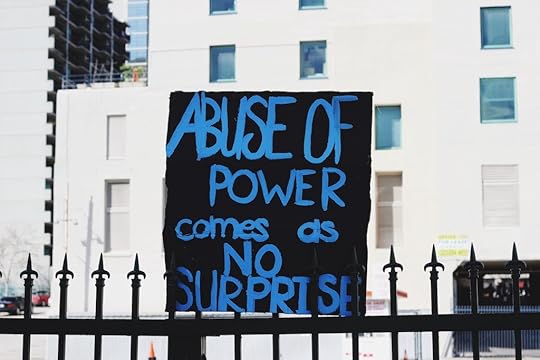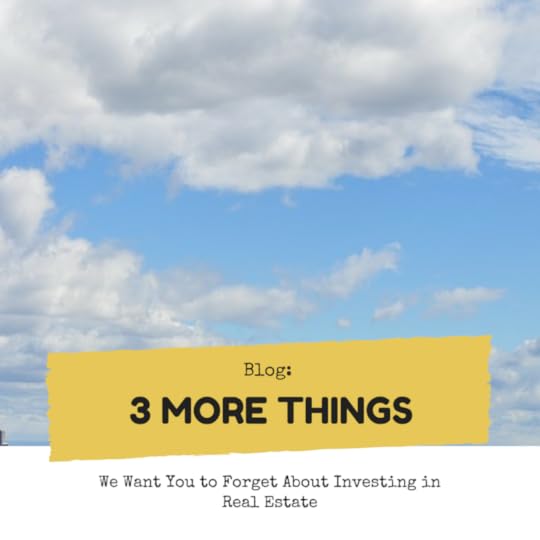Rhys Knight's Blog, page 2
April 23, 2018
‘To be Honest,’ is Not An Excuse to Be a Condescending Twat
 A pleasant river. Sans grave.
A pleasant river. Sans grave.I like learning. No, that’s a lie — I like taking on more information on my own terms. I admit that I don’t respond well to constructive criticism at the time of delivery, but after I get over my crippling rage, I do get the point, take it on board and improve.
Good feedback, for me, is communicated using small words, is succinct and offers me the opportunity to immediately improve.
Good feedback — I don’t feel like you described the forest in enough detail.
Bad feedback — The overall narrative needs to be reviewed, I can’t “see,” the forest and, as a result, don’t really get a sense from a location standpoint.
Piss off.
Also, putting the words, “frankly”, “don’t take this personally but…” or “to be honest” in front of feedback, doesn’t give you free license to be a dickhead.
I have never experienced a sentence that began with, “I’m not being rude,” and ended with anything other than brutal rudeness. Nobody ever said, “I’m not being rude, but I loved dinner.”
Putting stuff in front of sentences is a tool that manipulators have used since the beginning of time. I had a friend who would attempt to fictionalise real-life. Here’s how it would go –
“Let me tell you a story,” my friend would say. “It’s about a baker who used to live in France, and it was 1512, and there was disease and…”
Anyways, at the end of the story, he would raise his eyebrows and say, “Sound familiar?”
To which I respond, “no.”
Apparently, I was the baker and France was a metaphor for my house and…who cares…it was really annoying. The point is that this life was hard for bakers in 1512.
Another one of my favourite sentence beginners is the question — “can I be honest with you?”
It’s a great question because there is no way to wriggle out of it. If I respond to that question by saying, “no thanks, I’d rather you lied to me.” Then I am setting myself up for a very confusing conversation in which the other person will speak only in untruths. On the other hand, if I say, “yes please I would love you to be honest with me,” then I will end up with a conversation that ends in me burying a corpse in a shallow grave near this river I saw last week.
The most brutal sentence starter is, “to be honest…” It gives a false sense of freedom to the person giving advice. After all, who doesn’t like honesty? Do you want me to lie? No? Good, then, to be honest, you do nothing but make bad decisions, and smell like the inside of my microwave.
You’re welcome.
People shouldn’t be allowed to put anything but facts at the beginning of a sentence. Replace “to be honest,” with
“I’m about to say something horrible,” and, “frankly,” with, “I’m about to say something horrible, in a concise fashion.”
That way, nobody needs to get hurt emotionally or buried near a very picturesque river.

The 5am Club is a Big Pile of Lame and I Like Sleeping

I get up late, sometimes drink more than is medically acceptable and procrastinate more than I should. I get distracted by shiny things, like Netflix (have you seen Broadchurch?) and have trouble with serious conversations, where I use humour to transform meaningful conversations into pointless monologues about something inane.
I go to the gym semi-regularly, but there’s a really nice cafe just down the road, so sometimes I get distracted. Oh, I also drink too much coffee.
I’m not a motivation speaker.
I’ve been thinking about this because last Tuesday some asshole told me that I should join the ‘5am club.’ As you can imagine, I was pretty excited; it’s been ages since I stayed up until 5 am, and as a grown-up, I’m allowed to stay up as late as I want.
‘No…no,’ said the asshole. ‘It means getting up at 5 am every day.’
‘Why?’ I asked respectfully. ‘That sounds really stupid.’
‘It’s all about getting a jump on the world, taking control and winning the day. It’s been proven that most successful people are early risers.’
‘Interesting, and what is a successful person?’ I was intrigued, perhaps this asshole had a point, and I should start setting my alarm for…well, just setting my alarm.
‘Success means you’re earning more than you can spend and are living the life.’
‘What life?’
‘You know; fancy cars, woman, respect from those who matter and a secure future. Oh, and spiritual fulfilment.’
‘What if my idea of success is not having to get up at 5 am? Because I’ve tried it and there’s darkness and cold and my bed is warm and that’s where my wife is.’
‘Then you’ll never be successful.’
And just like that my fate was sealed; I am doomed because I don’t like being awake before everyone else. On the other hand, the stuff that I do is pretty fun and despite the fact that I am not a millionaire or the benevolent dictator of an African nation (yet) I get to be, me.
That sounded lame. I mean, I do what I want. Yeah, that’s way more adult.
The thing is, I don’t think that habits have as much to do with getting to a certain place in life as motivational books and that asshole seems to think. I mean, stuff sometimes just happens and although I like to beat myself up on unproductive days, who’s to say that it’s not those days that make me more productive on other days? What if a stress-nap and a drink slightly earlier than 5 pm isn’t the reason I work well on other days?
History is littered with people who lived life their way and still managed to not get randomly killed for being ineffective humans. So chin up, there may be hope for the rest of us who sleep until the sun comes up and then maybe watch Archer reruns while eating sugary cereal.

April 16, 2018
Anxiety and Depression are Reasonable Responses to Bad Bosses
 Photo by Samantha Sophia on Unsplash
Photo by Samantha Sophia on UnsplashWhen I worked in retail, my boss was a psychopath and as a ‘junior sales associate,’ I was a target for much of her wrath. Highlights included her screaming (literally) at me at for being on time, rather than early, and being berated in front of a customer for slouching.
But she wasn’t my worst boss; in fact, we’ve probably all had a boss like her.
Another one of my bosses was a middle manager in a technology company. My job was to cold call local businesses and pitch a new educational product that the manager was almost insanely optimistic about.
I remember one evening after work when he came over to my desk and leaned on my partition.
“Rhys,” he said. “You’re lucky to be in on the ground floor; we’re going to change the world here.”
Three months later sales figures were not what the manager expected, so he called all of us into a ‘sales meeting,’ and made us watch Glengarry Glen Ross. Afterwards, he explained that from now on he wouldn’t be such a “nice guy” and that we could expect a series of Alec Baldwin style abuse sessions over the next few weeks. To his credit, he followed through.
But even he wasn’t my worst boss.
Top of the tree was a stone cold sociopath who delighted in torturing his underlings. His favourite trick was inviting unwary team members out for coffee, and then loudly berating them in front of complete strangers over a latte. His moods would swing from high-fives and chatting about football, to physical intimidation and verbal abuse. He was really good at standing over people at their desks, and speaking just loud enough for everyone else in the office to hear.
One such incident involved a colleague of mine. The manager sat down on her desk so that she was forced to look up at him, and started explaining to her how useless she was. When she asked if they could move the conversation to somewhere more private he responded,
“I don’t waste my time with losers.”
What an asshole.
I was reminded of all these wonderful employers because a few weeks ago a friend of mine, someone I’ve known for almost 20 years, was telling me about his current boss. The stories echoed my own experiences, and when I came home and spoke to my wife about it, she started with her own stories of terrible bosses.
In retrospect, all my stories helped shape who I am, but the reality is that during those periods in my life, I was emotionally crippled. I felt powerless, afraid — both of keeping and losing my job — and as a result, I experienced anxiety and symptoms of situational depression. It was my final boss who finally pushed me over the edge and my breakdown was the excuse I needed to get away from horrible people.
As I was talking to my friend about his terrible manager, I couldn’t help but think that his response to the situation — increased fear, anxiety and insomnia — is a reasonable reaction to a completely fucked up situation. In fact, to not experience those symptoms, he would have to be lacking in emotional responses.
If we evaluate his responses based on cause-and-effect we can see a predictable pattern:
Made to feel inadequate = Anxiety
Anxiety = Sleepnesses
Job being threatened with no timeframe or means of rectifying the situation = Uncertainty
Uncertainty = Fear
I mean, how could my friend possibly not respond in such a predictable fashion? It’s like being told you’re going to be stabbed at some point soon, but not to worry about it. If he didn’t, it would be a sign of disturbing emotional detachment, which many psychoanalysts would treat with concern.
As I look back over my own career, much of what I’ve experienced emotionally has been my brain doing exactly what it is supposed to do. The responsibility is usually placed on the sufferer, and the sufferer’s mind, with the terrible boss, job, husband, wife, friend or situation being treated as an input. However, if the analysis were to begin with the situation itself, perhaps we would discover that mental illness is sometimes the healthiest reaction our body can produce in an entirely unhealthy scenario.

Anxiety and Depression are Reasonable Responses to Bad Bosses was originally published in rhysknightblog on Medium, where people are continuing the conversation by highlighting and responding to this story.
April 13, 2018
How to Create a Cliche from an Idea
 Photo by Thomas Peham on Unsplash
Photo by Thomas Peham on Unsplash‘Just create.’ This is the mantra of many copywriting coaches, photography courses and media advisors. It’s a seductive piece of advice, suggesting that all you need in order to succeed is to act, and from that action, something good will come. However, as many have discovered, just creating isn’t enough and many, having written a few articles on LinkedIn and developed a blog that got small readership and no results, and a Twitter feed that feels like a demonstration of the pointlessness of social media, have given up, resorting to more traditional promotion.
So where’s the gap? Why do some succeed and so many fail, when the distribution platforms are the same and everyone is constrained by the same words and mediums?
“Just create,” is not good advice.
In fact, it’s like telling a three-year-old that they’re doing a “very good job,” to increase their self-esteem; it’s nice, but doesn’t serve any tangible purpose. Better advice would be, spend more time thinking about what you’re trying to say, not how you’re trying to say it.
The idea is everything.
At the core of every great piece of content is a brilliant idea. It doesn’t need to be clever, it might be funny or sad, engaging or relatable, but the idea forms the central communication — the reader can take understand the idea clearly without needing to think about it. This is the most vital element of content in the digital age — being able to get that idea across quickly and effectively.
The audience needs to be able to relate without explanation or delay because if there’s any delay, you’ve lost them. This is where common knowledge and numerous advice columns will talk about how critical the headline, sub-headline and first sentence are — which is true — but that’s like saying you need fuel to make a car go fast; technically accurate, but it doesn’t get to the heart of what the problem is. To do this, we need to explore in more detail the anatomy of an idea.
Where do ideas come from?
It’s the question that’s plagued writers, artists, orators and singers for longer than anyone can remember. Some have said that ideas are everywhere, flying through the clouds and occasionally ducking down to earth for us to grab and bend to our will. A few have spoken of LSD, alcohol and other mind-bending intoxicants enabling them to access different parts of their brain in order to create ideas and inspiration at a higher level. Still more try to repackage the knowledge of others in a more accessible fashion, explaining the thoughts of geniuses in a more digestible way.
But it’s not about where ideas come from that matters, but how they’re ‘banked.’
Winston Churchill used to take naps, so did Joseph Stalin. Ernest Hemingway went fishing, Hunter S. Thompson shot things. Francis Bacon read cookbooks and Henri Matisse cut shapes out of paper. All wrote down ideas, told an assistant to note them, scrawled on paper or spoke into a recording device.
Regardless of what your line of business is, understanding that you need to take ideas and do something with them is crucial, and the first step is being able to take ideas that present themselves and help them evolve from theoretical precepts, into meaningful concepts. Taking something that has the potential to be exciting, meaningful or funny and being able to communicate it quickly and easily.
Write down theory, but speak concept
Theory is ugly, it’s a broad idea that has no basis in reality. Theory is a “what if?” It’s about questioning the status quo, or sensing there may be a joke, but the words aren’t quite there. In theory, you’ll find a basis and through writing it down you’ll give yourself something to talk about, to dissect and try to translate into concept.
Concept is tangible and explainable. Given a certain amount of time, and potentially a few raised voices, you can explain a concept, and, if it’s powerful enough, get someone to buy into it. Concept is something you understand, but perhaps have trouble explaining. If you’ve ever been to a sales training, personal development session or motivational speech and later attempted to explain a portion which you found powerful to friends, only to be greeted with blank stares and shrugs, you’ve taken a powerful cliche, and tried to explain it as a concept.
Cliches are monumental, they change the world. There are young clichés and old ones. Old clichés, having been repeated enough that they often make people roll their eyes in boredom — because they’ve heard it so many times before. They are passed down through generations and their wisdom is taken for granted. They may be short — “a bird in the hand is worth two in the bush”, or long in the form of fables such as Hansel and Gretel or Peter Pan. “The Scream,” by Edvard Munch is a good example of an art based cliché, being used in both art history and popular culture and being easily recognised, requiring no translation — the central idea being fear.
New clichés make people nod; their eyes glaze over as they recognise something in the words or images that resonate within them and from then on they are slightly different as their approach to life changes, perhaps ever so slightly. When we’re exposed to newly born clichés we share the joke, speak the knowledge –often as if it’s our own– and ask others to accept it. Those responsible for new clichés have the power to change how other people see and understand the human condition and the world around them. Movie makers have used this to their advantage, manipulating emotions and making audiences feel something different, rather than simply being entertained.
Good content is a newly born cliche, born ofone idea.

April 5, 2018
What a wonderful piece. Thank you.
What a wonderful piece. Thank you.

How to Tell Your Boss About Your Mental Health Condition
 Photo by Nathan Dumlao on Unsplash
Photo by Nathan Dumlao on UnsplashSo you’ve been diagnosed with a mental health condition.
Congratulations!
If you’re anything like me, the initial emotional reaction would have been one of relief; “thank fuck feeling like this isn’t normal and there are drugs and stuff.” But that feeling quickly subsides when you realise not everyone in the world is as supportive as television commercials for mental health awareness charities would have you believe.
Like that friend who keeps asking questions in an overly cautious way like you might start stabbing at any moment.
And that former colleague who, “doesn’t believe in depression.”
So, how do you approach your boss and explained that you are suffering from a mental health issue? Here are three methods that you may find useful.
1. Don’t…Just Don’tThis is especially good advice if your boss is (and this is a technical term) a bit of a dick.
What goes on in your head is none of your manager’s business, and unless it’s going to directly impact your work — psychiatry appointments, randomly yelling at colleagues et cetera — then it may be best to keep it to yourself. As discussed, not everyone is as forward-thinking as they should be.
If you decide your boss must know, then practice the following phrase,
“At the moment, I am experiencing what my psychiatrist has termed (insert your flavour of illness here), but I am receiving excellent support and am working through it. I just wanted to make you aware.”
Your boss will likely respond with,
“Thank you for telling me. Let me know if there’s anything I can do.”
This may translate to, “I hired a mental case. I’ll be Googling ‘how to fire lunatics’ as soon as I get back to my desk.”
This approach can work brilliantly if your boss sees themselves as something of a mother or father figure. In preparation, watch several daytime soap operas, and just before you enter the meeting think about your favourite pet, and how it died. As the tears begin to roll down your face, begin your Oscar-winning performance,
“I…I don’t know how to say this, but I have (insert a dramatic pause to build suspense; what could it be? The Plague? Polio?)…depression.”
“My goodness,” says your boss. “What can I do to support you?”
“You’re already doing it.”
Embrace.
Everyone’s experience of mental illness is different and before you choose to tell anyone, consider the implications. They could be far more significant than you think.

March 29, 2018
Mental Illness Should Not Be Categorised, But Normalised
 Photo by Priscilla Du Preez on Unsplash
Photo by Priscilla Du Preez on UnsplashMental illness, at least from a medical standpoint, is a melting pot of contradictions. While an understanding of the human brain, including the reasons for certain functions and an appreciation of the origins of thought, have been elusive to the scientific community, those responsible for the categorisation of mental illness have strode on relentlessly, if not clumsily.
The list of categorisations of various types of anxiety, depression and mental disorders is limitless; from ‘situational depression,’ where a certain circumstance has triggered temporary depression-like symptoms in a patient, to ‘atypical depression,’ where fatigue and lethargy are underpinned by chronic sensitivity. Then there is ‘seasonal affective disorder’ (SAD) which causes people to feel depressed at a specific time during the year — most commonly during winter months — and ‘persistent depressive disorder,’ otherwise known as dysthymia, which is a persistent and mild form of depression that can lead to, severe or chronic depression. Then there are the subcategories within each of the major categories, which mean that a patient can be diagnosed with several types of depression and anxiety.
The problem here is not the attempt to categorise mental illness, but the ungainly work of focusing on mental experience — thoughts and emotions — as a means to put patients in easy to understand boxes. Where other areas of medicine are simple to categorise and therefore treat, the brain is something we still do not understand the workings of. Attempting to extract symptoms and therefore perform a diagnosis using a cross-section of experiences and then offering those findings as categories, leads not only to common misdiagnosis but also confusion — something that sufferers cannot afford.
I should have received psychological treatment years earlier than I did, but I was convinced that I didn’t have depression because I wasn’t sad, angry or upset and I still functioned effectively as a human being. I Googled and Wikipedia’d during my darker moments, read some essays and took some tests and found that the emotional categorisations didn’t fit. Terms like ‘tired,’ ‘depressed,’ and ‘sad,’ didn’t describe me at all. I was living in a constant cloud that stopped me from feeling anything at all, but depressed or sad? Absolutely not.
On YouTube and blogs, sufferers spoke of different symptoms — a sense of hopelessness or perhaps a feeling of dread.
Getting closer.
In the end, it was a complete mental departure from reality that forced me to get help, but had this not happened, the system of categorisation may have meant that I carried on, living a half-life of adherence and fear.
The insistence of the psychiatric and mental health community to feign an understanding of brain function means that problems that need to be solved, aren’t. A perfect example of this is the use of selective serotonin reuptake inhibitors (SSRIs). This group of antidepressants works to artificially prevent the reabsorption (removal) of the neurotransmitter serotonin. Serotonin is a neurotransmitter that works to regulate mood, the theory is that increased levels of serotonin will decrease feelings of anxiety, depression, sadness…you know, moods.
But it doesn’t always work like that, and as with everything else to do with the brain, the reasons for this are speculative. In some cases, SSRIs produce predictable, good results with patients experiencing a decrease in extreme emotions, and — as my psychiatrist described it — a chance to “see the wood for the trees.”
However, in many cases the drug either doesn’t work, or even has a negative effect. There are a number of physical side-effects, but perhaps most disturbingly, there is a certain percentage of the population that will statistically be more likely to consider killing themselves on SSRIs.
Why? Nobody knows. but experts will claim with confidence that there is, “enough evidence,” to form a, “solid hypothesis.” Dig a little deeper, and you will discover that having enough evidence apparently means drawing a logical conclusion, rather than a definite answer. Worse still, experts on the human brain cannot reach consensus on…pretty much anything.
This level of uncertainty has enabled politicians and the media to apportion blame for many of the world’s problems on sufferers of mental illness. The National Rifle Association (NRA) has repeatedly claimed that mental illness is a major contributor to mass shootings, apparently even more so than accessibility to weapons. This is a savvy political move on their part (and they are not the only guilty party) because it’s hard to argue that anyone who chooses to shoot another person has some major psychological issues. Depression perhaps, or anxiety. And it’s here that the clumsy categorisation of mental illness becomes dangerous. The clumsy categories and subcategories mean that everyone essentially falls under one banner — mentally ill.
But if we can’t, and shouldn’t, attempt to categorise mental illness in terms of emotions and feelings, then, what?
We have stumbled into this age of categorisation by accident. This is not the place for the history of categorisation, but if you would like to do some research there are plenty of resources available. In summary, the medical community came up with a number of definitions, which have been expanded on since the early 20th century, resulting in the incarceration and surgical abuse of hundreds of thousands of people. Why? Because society at that stage relied on an educated elite to provide insights and solutions to the world’s problems. It was far easier to shove, “crazy people,” in a mental asylum, than let them roam the streets. What we have now is an extension of that original categorisation methodology — we don’t completely understand what’s going on, but we will trust a bunch of smart people who speak convincingly.
The solution, is the normalisation of mental illness. This means no longer treating those who are afflicted, as people requiring medical intervention. Essentially removing the stigma around issues related to the brain, accepting that everyone is prone to experience a neurological chemical imbalance at some stage in their life.
Post Natal Depression — An Example
For example, a woman has a baby and is forced to confront a lifetime as a mother — something she has never considered before. She feels no connection to her child, and has feelings of extreme guilt as a result. Added to this, she considers her old life, one that she loved, and realises that it will never return, her future is uncertain and she is terrified. Also, she doesn’t feel comfortable talking to anyone about it because she is supposed to be a, “ good mother.” If she doesn’t love her child, then she doesn’t deserve the mantle and by definition she is a bad mother.
All of this goes on in her head with no respite, while she is attempting to learn how to raise a tiny human. Frankly, a sense of depression is a reasonable reaction to this confusing and overwhelming circumstance. She doesn’t need to be diagnosed with a medical condition, she needs to be offered support, and perhaps some medication to, “see the wood for the trees”. She should be told that what she is experiencing is entirely normal based on her own thought patterns. She isn’t a bad mother, and she isn’t just a categorisation. Why does this matter? Because in the midst of overwhelm and fear, the addition of mental illness is the equivalent of pouring gasoline onto a fire. Most importantly, the categorisation itself serves no purpose at all.
Imagine this mother, instead of of being forced to go to a doctor and fill in a questionnaire that deems her to be suffering from some form of postnatal depression, is instead referred to a group of mothers that have been through a similar psychological experience. In a supportive environment, each of the mothers talks about, and laughed about, and cries about, what they went through and are going through. There is no talk of diagnosis or ongoing issues, the focus is on how hard it is to be a mother sometimes, and hints and tips to work through unhelpful feelings.
It has been said that depression is the most over-diagnosed medical condition in the world. I think it is probably under-diagnosed, and with good reason. In our society, it is not okay to be mentally ill, and the stigma and negative connotations are real. People treat you carefully, or with concern or caution and until this stigma is eliminated, the number of people who don’t get the help they need, will continue to rise.
Mental illness is normal. We don’t know how our brain works, or appreciate why certain neurotransmitters are activated at certain times. It’s why one person can ride a rollercoaster and feel exhilarated, and another can ride exactly the same rollercoasters and feel terrified. The terrified person is not abnormal, or in need of any form of medical treatment, they are experiencing life in a way that is different to the other person. Likewise, the exhilarated individual is not immune to fear, nor do they lack any form of sensitivity — it’s just their experience of life, helped (probably) by the way their neurotransmitters are activated.
There is no use anymore for clumsy categorisations, over and above the creation of academic papers and hypotheses that could easily be disproven, resulting in years of mismanaged patients. Antidepressants and other drugs should still serve a purpose — but as tools to clarity, rather than solutions to a medical problem. Let’s allow the next generation to experience mental ups and downs of life, with support and understanding rather than the pain and stress associated with a medical diagnosis.

March 28, 2018
Mental Illness Isn’t about Health, but Empowerment
 Photo by Joshua Earle on Unsplash
Photo by Joshua Earle on UnsplashI was diagnosed with ‘severe depression,’ at the peak of my corporate career. Within three months, I was working as a labourer on a building site, having moved out of my house and into a small apartment with my wife and brand new daughter.
I was lucky.
Depression, for me, felt like drowning. I was out of control and at the mercy of everything happening around me, circumstances would change — positively and negatively — without me feeling like I was an active participant and as a result I felt like a fraud and a failure at the same time.
Every time the CEO visited our office, I was sure he would fire me, and I would spend the night before sweating (literally, I ruined our mattress) and struggling to breathe. The sacking never happened, and there wasn’t even a hint it would. In fact, our office won several awards, but in my head, I was still a fraud.
When I got a promotion, secondment or received a pay-rise, I felt like there had been a mistake or that I had tricked somebody despite the fact that everyone including my manager, kept pointing out that I worked hard and was doing a good job.
Eventually, my head won. Following a meltdown at work (think being in the fetal position, speaking in riddles) I was sent to a doctor who immediately referred me to a talented psychiatrist who was superb and offered me the chance to speak and be heard at a meaningful level. I was also put on medication, and given a laundry list, both of things that I could no longer do and that I had to start doing.
The above paragraph is an accurate summation of the treatment program for most people with mental illnesses. First, an incident occurs that identifies the person as suffering from depression, anxiety or whatever else. Then, a medical professional performs a diagnosis and a treatment plan is put in place and…well, that’s pretty much it.
Now all of this is fine, but the question must be asked, seeing as treatment plans vary significantly, is there an element either related to the treatment plan or not that means the difference between improvement or not?
Obviously, there’s no simple answer to this because everyone experiences what we term ‘depression’ differently. In a few decades, we’ll look back and laugh at how we used to lump so many diverse emotional and mental experiences into one single, clumsy piece of medical terminology. But for me, the answer to my depression was empowerment. Or, maybe that is better termed, ‘permission.’
When I had my breakdown at work, my wife let me off the hook. She gave me permission to leave my career of ten years and take a job as an unskilled labourer without freaking out about money or the future and this gave me some space to think, or perhaps not think, at least for a while.
This wasn’t an easy thing to do. I was earning pretty good money (more than a writer earns, I’ve since discovered) and I had plenty of other businesses that would have employed me. There was an easy, temporary solution — get another job and it’ll be better. Probably.
But I was permitted to do something else, with no terms and conditions attached. As I look back on my experience, it becomes apparent that without this crucial element and the mental freedom it offered, I would have continued to painfully and slowly spiral. Instead, I rebuilt myself over a period of years and while the ‘old me’ would laugh at my current life choices, he was a bit of a dick so I don’t really care what he thinks.
It’s not that depression isn’t a medical issue, it’s just that this kind of clarification is clumsy and not useful. Below the surface of this generalisation lies something else and for me, and perhaps someone you know, that thing was a need to change.

February 1, 2018
‘Advocating Change’ is Now a Race to Victimhood
I’m going to begin this article with a challenge. Regardless of your political leanings, try to hear what I have to say before labelling me a shady socialist or a right-wing populist. Because over the last few years, our rights to have beliefs without being labelled has been taken from us.
I’m going to explain why I think that is important.
On 26 January, Australia Day is celebrated. Like many national holidays, it is not without controversy; January 26 was the day that English explorers arrived in the country and is seen by many as the beginning of a colonial rule that subjugated the native population. An aboriginal advocate who I’m not going to bother naming stated at an ‘Invasion Day’ (clever play on words) rally,
“F*** Australia. Hope it burns to the ground.”
Of course, this was just one person’s opinion, and the wonderful thing about freedom of speech is that anyone can jump onstage and advocate the destruction of a country. The response was predictable initially, with standard reactions including shock and disgust…then things got a bit weird.
The person who made the comments claims she was just using “metaphor,” when she said she wanted Australia to burn to the ground and clarified this by stating,
“It was a metaphor, not actually a statement to be taken literally. I just want everything, all the governments to fall apart, because our people are dying and nobody cares and the whole system needs to change. The leaders of this country continue to ignore and oppress us. I am sick of our people getting locked up and dying in custody, of our young people suiciding.”
Resisting the obvious temptation to ask if ‘wanting all governments to fall apart’ is a metaphor also, and the somewhat more nerdy temptation to get into a long-winded conversation about what a metaphor is, I think you can safely assume that this did nothing to change public opinion.
Then, a Twitter hashtag started trending in support of this poor downtrodden woman who was just trying to get her point across through the use of imaginative language. Thousands and thousands of people defended her against the trolls and oppressors who said they didn’t want Australia to burn.
That’s thousands of Australians defending a woman who said she wants Australia to burn.
Meanwhile in America, the #metoo movement, bravely started by the actions of actress Rose McGowan, given a hashtag by Alyssa Milano and then hijacked, toned down and confused by many others, continues to give voice to victims of sexual harassment and alienate them in equal measure. As it ends up, there are several grades of sexual harassment and if you don’t fit into one or two of the big ones, then you don’t have a right to the hashtag.
Here is the formula. If you are famous and were harassed by another famous person, then what happened to you is unacceptable. After all, as the media pundits — many of whom earn hundreds of thousands of dollars a year — keep explaining, the entertainment industry has been rife with this kind of misconduct for too many years.
True.
And in a show of solidarity, all these famous, rich starlets and stars are finally getting the protection they deserve.
Then, Aziz Ansari.
A woman, who had been on a date with Ansari spoke out anonymously on babe.net. explaining in graphic detail how she had been cajoled and manipulated into performing, and receiving, oral sex. She reportedly told Ansari,
“I don’t want to feel forced because then I’ll hate you and I’d rather not hate you.”
That’s a no.
Following this was when the sexual encounter took place.
Unfortunately for this woman, she is not famous. The news media were quick to explain to her, like a condescending parent, that what she experienced was not sexual harassment, but a “bad date.”
I wonder if those speaking down to this woman would offer their daughter the same advice had she told a man that she didn’t want to feel forced, and was then encouraged to perform oral sex.
But it’s too late for that woman now, because the mantle of victimhood has been passed to Ansari. Even while Scarlett Johansson publicly accuses James Franco of an unsubstantiated crime at the 2017 Women’s March without a public outcry at lack of due process, Ansari’s victim is labelled as attempting to capitalise on the #metoo movement.
This is where the apportioning of names and labels becomes important. We all care deeply for the victim because at some point in our lives we have all been him or her. We want to look after the victims and protect them — we want everyone to be safe, because we want to feel safe.
But just as a hero needs a villain, a victim needs an oppressor. Someone who believes in evil things and wishes people harm. Depending on your perspective, these are the right-wing hardliners, or the left-wing socialists — the protestors or counter-protestors.
It feels nice to have these people because it makes the problem clean and simple. If we can ‘beat’ these people, then the victims have been saved. “Look at me, this is what I believe in and I’m right and you’re wrong!” It’s a tactic used by governments who wish a portion of the population to be labelled ‘un-American’ or ‘anti-establishment’ or ‘part of the problem.’
We had a war on drugs to simplify a complex problem. That didn’t work. In fact, possibly the biggest problem with democracy is that politicians campaign on quickly and easily solving complex issues, which cannot be solved quickly and easily.
Now we are duplicating that behaviour in daily life. I am neither a right-wing extremist, nor a left-wing agitator. I believe that no woman deserves to be sexually assaulted and that everyone has a right to disagree with the government. I don’t like it when people threaten to burn a country, but I also believe in freedom of speech, and I don’t consider that an oxymoron.
I also don’t believe in oversimplifying problems by categorising people. Having an opinion does not make you a victim or a hero. It doesn’t allow you to claim the mantle of Lennon or Marx, or Hitler for that matter.
Our society is rife with complex issues and only open, robust discussion and compromise will enable us to move forward. Let’s begin by not allowing movie stars, media outlets or politicians to claim the perceived moral high ground or victimhood status. Let’s approach issues for what they are, remove the personalities and come up with some solutions.

January 11, 2018
20 SEP 3 MORE THINGS WE WANT YOU TO FORGET ABOUT INVESTING IN REAL ESTATE

Our previous blog, 2 things we want you to forget about real estate investment discussed two important misconceptions — that you need a deposit to buy your first home, and that your first home cannot be your dream home. Now, we are going to address another 3 mistruths that you should disregard immediately.
There are, “Good,” and “Bad,” AreasThis is a truth that has grown to ridiculous proportions. While it’s true there are some areas in every city on the planet that you would not want to live in due to excessive poverty, violence or the potential for natural disaster, it’s an oversimplification to regard a city as having good and bad areas.
Why is this important? Because plenty of opportunities are missed through a lack of understanding ofcertain areas. Take a drive through any suburb and you will likely find streets with front lawns mown, kids playing in the yard, neighbours chatting to each other and good schools nearby. These are the obvious marks of a good area, and so often because of the postcode, first home buyers end up purchasing something of a lower quality in a, “better,” area. Speaking of bad areas…
Expensive Areas will be Worth More in the Long RunThere is a long list of first home buyers who have sacrificed in order to purchase in an expensive area. They do this because of the think their property will increase in value faster because the area is, “better,” than other suburbs. Of course, this is not necessarily true, and even if it is, everything is relative. If they purchase a property for X amount in a great area, and it increases in value by 12%, the difference in actual tangible value will be comparable to them purchasing a property in a less expensive area which returns a slightly higher percentage. Even if the overall return is higher, the cost has been living in a worse house for an extended period. Purchase an area where families congregate, and people take pride in their property. These are the areas that people want to live in, and spots which are most saleable.
I May Be Better Off RentingThis statement is usually made concerning cash flow. When you are paying a certain amount and rent and you look at mortgage repayments which will be excessively higher, suddenly lifestyle and sacrifice become major factors in your decision making. In addition, crippling mortgage repayments mean that you can’t put money aside for savings and as a result, you find yourself in a terrible position when an emergency occurs.
This is all true — if you purchased something that was outside your means.
A well-structured mortgage should allow you to have money left at the end of the month, and the ability to save. Of course, most of your savings will end up being in property; as the value of the property increases, your equity goes up, and you have something you can leverage against should you require it. The critical element here is making sure that the mortgage you are taking out is designed with you and your family in mind. Look at your outgoings, budget for emergencies and work with your advisors to create a package that will suit you in every circumstance.
Want to learn more click here
OUR OFFICES
BELOUIS Queensland Head Office:
Gold Coast PO Box 188,
Upper Coomera, Qld 4209
Ph: 07 5529 4500
BELOUIS Sydney Office:
Rockdale, Sydney, NSW 2216
BELOUIS Melbourne Office:
Port Melbourne, VIC 3207
Copyright Belouis 2016. Webdesign by TGDC. Belouis Privacy Policy Terms & Conditions ABN: 82 154 487 448 Belouis Investment Group

20 SEP 3 MORE THINGS WE WANT YOU TO FORGET ABOUT INVESTING IN REAL ESTATE was originally published in Belouis Investment Group on Medium, where people are continuing the conversation by highlighting and responding to this story.



